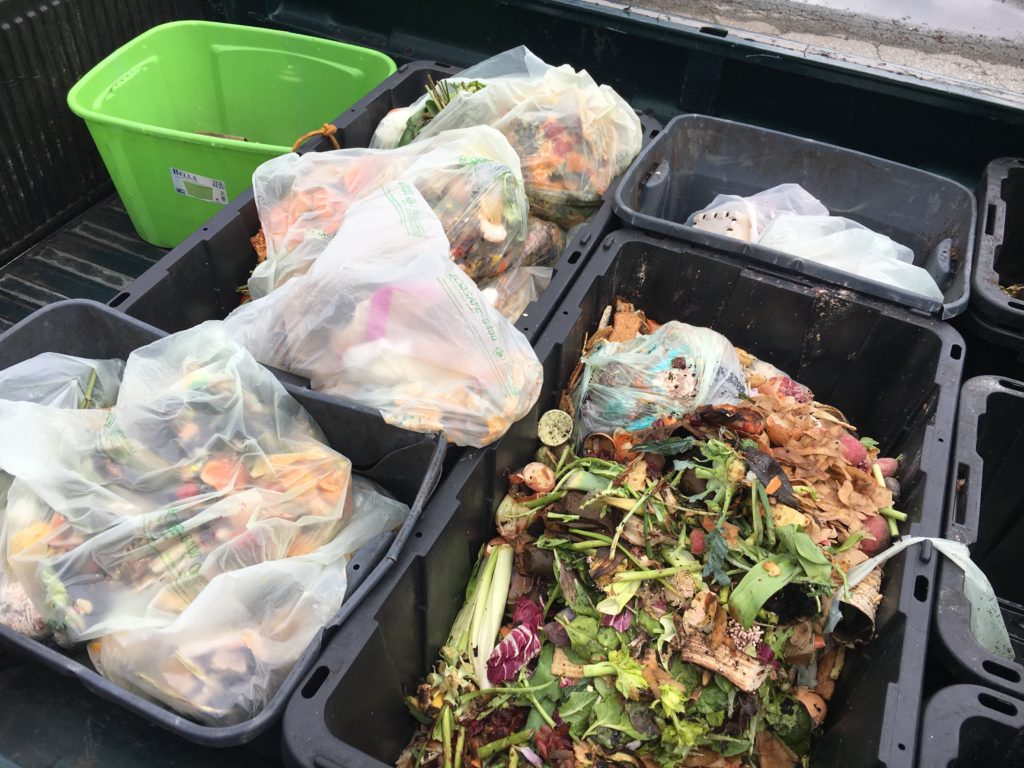
At the Powder Mill apartment building, food scraps are collected and sent to Brick Ends Farm in Hamilton, where it breaks down and becomes nutrient-rich soil. Photo: Courtesy of Roots Compost
Affordable composting has arrived in Lawrence, Massachusetts. A pilot program spearheaded by local groups and Conservation Law Foundation gives residents of the Union Crossing/Duck Mill apartment building an easy way to get their food scraps out of landfills and turned into rich soil.
The pilot launched in April with representatives from the community development group Lawrence CommunityWorks, which owns the apartment building, First Realty, which manages the property, and Roots Compost, a local curbside composting company. It’s the latest way that CLF’s Zero Waste program is working to change the way Massachusetts – and, ultimately, all of New England – deals with our waste.
The goal of the pilot: to show that curbside composting in an urban neighborhood is not only possible, it’s easy, affordable, and something residents are excited to do. The pilot could be the beginning of a transformation in how cities in New England manage their trash. Expanding curbside composting to the entire Lawrence community and beyond could slash our landfill waste by 25 percent a year.
Massachusetts Apartments Need Composting – Badly
Most Massachusetts households have their waste and recycling collected by their city or town, which provides bins for curbside pickup. But 13 percent of Massachusetts residents live in apartment buildings, which aren’t included in these waste and recycling collections. In Lawrence, the percentage of people living in apartments is even higher.
Most cities in the Commonwealth classify apartments as commercial buildings, which must pay a private waste hauler to provide and empty a dumpster. That goes for recycling and composting as well. Property managers or the waste management company have no incentive to provide recycling services, let alone composting. With limited or no backyard space, apartment residents have no other option but to throw their food waste in the trash, where it is then hauled to the local landfill for burying or burning.
Food Waste is a Problem No Matter Where You Live
Food waste makes up most of what households throw away, both for homeowners and apartment dwellers. If it were composted instead of trashed, we would all save money. The cost of sending trash to a landfill in Massachusetts rises past $80 a ton, so finding better ways to dispose of – or better yet, reduce – our waste is good for our wallets. There’s also an environmental benefit. In a landfill, food waste generates methane, a potent greenhouse gas, making landfills the third largest source of climate-damaging emissions in the United States.
Some cities and towns in Massachusetts, like Natick and Cambridge, are piloting curbside composting programs citywide, while others have encouraged residents to start a backyard compost pile to cut how much trash they produce. However, large apartment buildings are often left out of these programs. In Cambridge, the composting pickup does not include buildings with more than 12 units – leaving out 19,700 households in the city.
Existing Composting Programs Aren’t Accessible to Low-Income Residents
Higher-income cities like Natick and Cambridge can operate such programs because they can afford their startup costs. Larger and wealthier communities are also more likely to have staff able to apply for grants to support these efforts.
In cities without compost pickup programs, residents can hire private, door-to-door pickup services like Roots, Black Earth, Bootstrap, or CERO. But because these companies’ customers are spread out, their services often cost more than low-income residents can afford.
A persistent myth in the U.S. is that apartment residents don’t recycle or compost because they don’t care. This is simply not true. Cultural and economic barriers don’t prevent apartment residents from wanting to recycle and compost. Cost and access do. That’s where the Lawrence pilot program comes in.
CLF’s Pilot Is Exploring a Solution for Duck Mill and Beyond
Located on the Merrimack River, Duck Mill is home to 73 families spread across 4 floors. Twice a week, the trash dumpsters on the first floor of Duck Mill are emptied into a truck and the waste hauled to an incinerator in North Andover. Such frequent pickup is needed to maintain sanitary conditions in the trash room, since food waste in the dumpsters begins to rot, smell, and attract rodents within a short period.
Some residents, however, now have a different routine. When the composting pilot kicked off in April, residents on the fourth floor were given a five-gallon bucket with a biodegradable liner. They heard a rundown of and learned what can be composted – organic waste, including food scraps, vegetable peels, bones, and soiled paper towels – and the pick-up schedule.
Now, instead of tossing food waste into the trash, they empty their filled buckets into a chute outside their doors, where it ends up in special new dumpsters on the first floor. From there, the food scraps are hauled to Brick Ends Farm in Hamilton, where they break down and become nutrient-rich soil.
If everyone in the building composted their food waste, the trash room would no longer smell or attract pests as quickly. Trash collection could also be reduced to once a week, saving thousands of dollars a year and more than covering the cost of compost pickup for the entire building.
A Model for Cutting Food Waste
Working together, CLF, Lawrence CommunityWorks, and Roots Compost are showing that it’s not only possible to bring successful, affordable composting to apartment buildings. As the pilot wraps up this fall, CLF’s partners have agreed to expand composting to the entire building. Lawrence CommunityWorks owns several other buildings, and adoption in other apartments could mean a major change to the city’s trash. This kind of partnership is just one of many creative ways that composting can be accessible to low-income communities.



